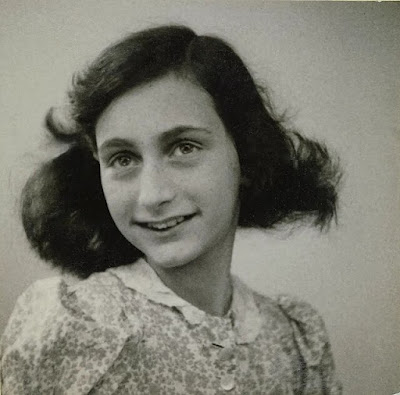Between Love and Distance: A Complex Family Dynamic
Anne Frank was not just a historical figure; she was a daughter growing up in extraordinary circumstances. Confined within the walls of the secret annex, her relationship with her parents, Otto and Edith Frank, evolved under the weight of war, fear, and the struggles of adolescence. Anne, a girl bursting with emotion and independence, often found herself caught between admiration, frustration, and a deep longing for understanding.
 |
| Otto Frank, 1936 |
Otto Frank: The Guiding Light
Otto Frank was Anne’s anchor in the annex. A cultured and educated man, Otto encouraged Anne’s love for literature and writing. He was patient, soft-spoken, and the one person Anne felt truly understood her.
Through her diary, she expressed her unwavering bond with her father:
“I worship Daddy. He’s the one I look up to. I don’t love anyone in the Annex as much as I love him.”
Yet, even this deep admiration did not spare Otto from Anne’s inner conflicts. She longed for his approval, but at times, she resented the way he tried to mediate family tensions rather than fully taking her side. Still, in the midst of a world unraveling, Otto remained her haven, the figure she trusted above all.
Edith Frank: A Mother Misunderstood
Anne’s relationship with her mother, Edith, was more strained. Unlike Otto, who was patient and encouraging, Edith was reserved and emotionally distant. Anne often described her mother as cold, struggling to connect with her on an emotional level.
In one of her diary entries, Anne wrote:
“Mummy and I have never been very close, and now, as time goes on, we drift apart even more.”
Edith, however, was enduring struggles of her own. The stress of living in hiding, fearing for her children’s safety, and maintaining a fragile sense of normalcy weighed heavily on her. While Anne saw her mother as strict and unapproachable, Edith was fighting silent battles, trying to keep her family together in unimaginable circumstances.
 |
| Edith Frank, 1935 |
The Tensions of Adolescence in the Annex
As Anne grew older, her need for independence clashed with her mother’s expectations. She saw Edith as someone who favored her older sister, Margot, which only deepened the rift between them. The annex, with its cramped quarters and forced proximity, amplified every disagreement, making small conflicts feel unbearable.
Despite these struggles, Anne’s diary reveals moments of self-reflection, where she questioned her harsh judgments and wondered if she was being unfair to her mother.
A Shift in Understanding
Towards the end of her time in the annex, Anne’s perspective began to shift. She acknowledged that her mother loved her, even if she struggled to express it. She started to see Edith not just as a strict parent, but as a woman who was scared, exhausted, and trying her best under impossible circumstances.
“I misjudged Mummy. She is not a bad person.”
Unfortunately, the war robbed Anne of the chance to mend her relationship with her mother. Edith passed away in Auschwitz, heartbroken and alone, having given her last scraps of food to her daughters in a final act of love.
Otto Frank: The Survivor’s Burden
Otto was the only member of the Frank family to survive. When he returned to Amsterdam and was given Anne’s diary, he was confronted with the raw, unfiltered emotions of his teenage daughter.
Reading her words, he realized how much she had struggled with her relationship with Edith, and how she had idolized him. In one of his later interviews, he admitted:
“I did not know my daughter in the way I thought I did.”
He dedicated the rest of his life to sharing Anne’s story, ensuring that her voice, and the voices of those lost, would never be forgotten.
YOU CAN FIND HERE: ANNE FRANK'S HOUSE PHOTOS
Legacy of a Daughter’s Words
Anne Frank’s relationship with her parents reflects the universal struggles of adolescence—seeking approval, rebelling against authority, and striving to be understood. Yet, in the context of war and confinement, these struggles took on a new depth.
 |
| Anne Frank smiling for her school portrait |
Through her diary, we glimpse not just a girl in hiding, but a daughter trying to define herself in the shadows of her parents. Her words continue to resonate, reminding us of the fragility of life, the complexity of family, and the enduring power of a young girl’s voice.
If you found this story moving, share it with others to keep Anne’s voice alive 💖





